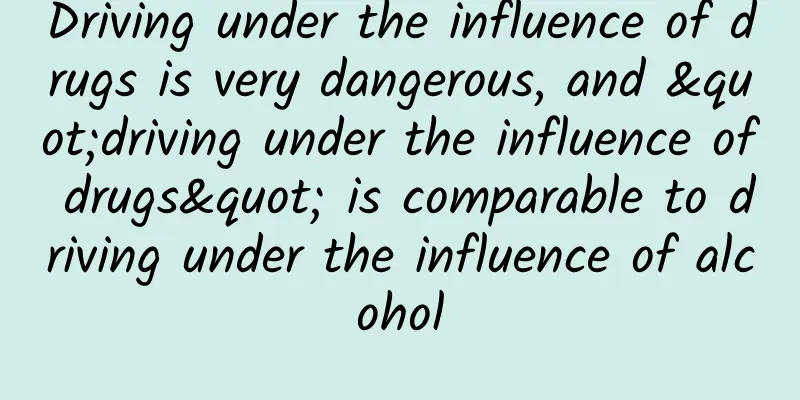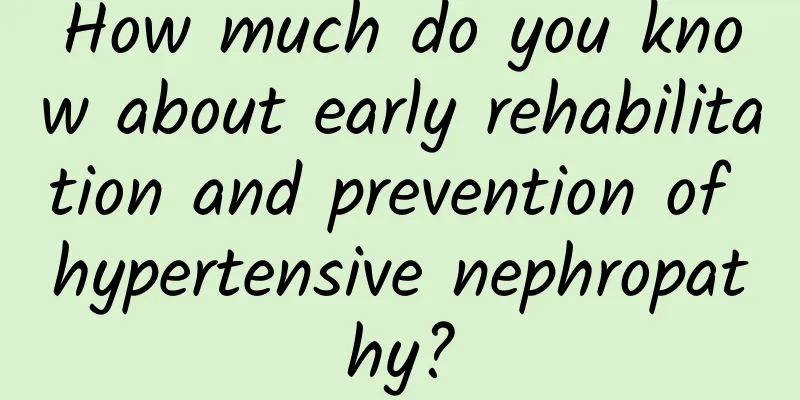Driving under the influence of drugs is very dangerous, and "driving under the influence of drugs" is comparable to driving under the influence of alcohol

|
Drunk driving is a commonplace issue, but how much do you know about "drug driving"? Foreign data show that the proportion of traffic accidents caused by drivers taking drugs is several times higher than that of drivers who do not take drugs; domestic data show that traffic accidents caused by driving after taking drugs account for about 10% of all traffic accidents. Therefore, driving after taking drugs has become one of the important causes of traffic accidents today . So which drugs should we pay attention to? 1. Most cold and allergy medicines Cold medicine has the function of inhibiting the central nervous system. It often contains anti-allergic drug ingredients (chlorpheniramine). At present, the commonly used cold medicines include Xin Kangtai, Quick Cold Capsules, Tylenol Cold Tablets, Ganmaoqing, Kangde, Day and Night Baifuning, etc. The adverse reactions after taking these medicines are headache, dizziness, fatigue, tinnitus, tension or anxiety, decreased alertness, distraction, making the driver's brain slow to react, unable to concentrate, and even drowsy, affecting driving function. Antiviral drugs such as amantadine (some compound cold medicines contain this ingredient) can cause insomnia or excitement, ataxia, dizziness and other symptoms. Anti-allergic drugs Commonly used anti-allergic drugs include diphenhydramine hydrochloride, promethazine hydrochloride (phenergan), chlorpheniramine, ketotifen, cyproheptadine hydrochloride, astemizole, etc. After taking these drugs, symptoms such as drowsiness, dizziness, headache, fatigue, tremor, tinnitus and hallucinations may occur, which may easily cause traffic accidents. 2. Antitussive and analgesic drugs Commonly used antitussive drugs include codeine, carbetapentane, dextromethorphan, etc. After taking them, you may experience drowsiness, dizziness and other discomfort reactions. Overdose can also cause excitement, irritability and restlessness, thus affecting driving safety. Commonly used antipyretic analgesics include aspirin, aminopyrine, ibuprofen, indomethacin, etc. Taking excessive doses of aspirin, aminopyrine, etc. may cause side effects such as dizziness, tinnitus, decreased vision and hearing, and heavy sweating. In severe cases, it may cause collapse. Occasionally, dizziness, headache symptoms may occur after taking ibuprofen, and a few people may experience decreased vision and difficulty in distinguishing colors. After taking indomethacin, headache, dizziness, hallucinations, depression, etc. may occur. 3. Antihypertensive and anti-anginal drugs Antihypertensive drugs such as nifedipine (Nifedipine), reserpine, propranolol (Inderal), etc. After taking the medicine, symptoms such as fatigue, drowsiness, dizziness, lightheadedness, dizziness, vertigo, and hallucinations may occur. Anti-anginal drugs such as nitroglycerin, pentylenetetrate, dipyridamole (peryridamole), perhexiline (xinshuning), isosorbide dinitrate (isosporin), etc. Common side effects of anti-anginal drugs include dizziness, headache, vertigo, blurred vision, fatigue, postural hypotension, tachycardia, etc. 4. Drugs for the treatment of peptic ulcer Commonly used ones are ranitidine, famotidine, metoclopramide, etc. After taking the above drugs, symptoms such as headache, dizziness, drowsiness, tinnitus, fatigue, tremor, and ataxia may occur. 5. Hypnotic drugs This type of drug is widely used to treat insomnia, and can also adjust mood and relieve mild anxiety, depression, tension and irritability. This type of drug can reduce a person's driving ability such as reaction time and attention allocation, damage dynamic vision, and make people dizzy, sleepy, lack of energy, anxious, drowsy, tired, dizzy, and mentally confused. In addition, some drugs for treating motion sickness contain sleeping pills, which can cause drowsiness and sluggish movements after taking them. 6. Antidiabetic drugs Common blood sugar lowering drugs include insulin for injection, oral sulfonylureas, acarbose, etc. If you inject drugs or take too much medicine and then do not eat in time, the rapid drop in blood sugar will induce hypoglycemia, which can lead to convulsions, coma, confusion and other symptoms. It is recommended that diabetics carry some dry food and sugar cubes in the car. If you experience hypoglycemia symptoms such as panic, fatigue, sweating, etc., pull over in time and replenish energy to avoid dangerous driving. 7. Antipsychotics Commonly used anti-anxiety drugs include sleeping pills, chlordiazepoxide, hydroxyzine hydrochloride (Antalol), etc. Common adverse reactions after taking them include headache, drowsiness, fatigue, palpitations, etc. Antidepressants are drugs used to treat low mood, depression and negativity, such as imipramine, clomipramine, maprotiline, etc. After taking the medicine, symptoms such as fatigue, drowsiness, blurred vision, muscle tremors, and slow reaction are often accompanied. Therefore, it is best not to drive while taking medication. If you must drive while taking medication, you should pay attention to the following points: Ⅰ. When seeing a doctor or buying medicine, you should actively state "I am a driver" and ask the doctor to avoid prescribing medicines that have obvious adverse reactions to driving safety. Ⅱ. Drivers should read the instructions carefully before taking medicines and pay attention to the ingredients, usage and dosage, contraindications and side effects of the medicines. Ⅲ. When driving while taking medication, you should always pay attention to your own condition. If you feel unwell or abnormal, you should stop and rest. If the situation is serious, seek medical attention immediately. Author: Chen Ye Liu Yanping |
>>: [Popular Science Classroom] Nutritional care and lying care for patients in orthopedic wards
Recommend
Recurrent burning sensation in female urethra
A mild burning sensation at the female urethral o...
What to do if you are afraid of cold during confinement
During the confinement period, female friends do ...
What is the best contraceptive method for women after abortion?
Abortion is not only harmful to the body, but als...
How to detect ovulation with a thermometer
Ovulation is a normal physiological behavior of m...
How to check for breast disease?
Women often suffer from breast diseases, such as ...
What are the side effects of chemotherapy for breast cancer?
Breast cancer has now become a killer of women, s...
What are the steps in the makeup process?
Modern people live under conditions of abundant m...
How to improve the bad uterine environment
When you just start to experience cold limbs, fea...
What kind of tea is Guangxi Liubao tea? What does Liubao tea taste like?
Liubao tea is dark brown and shiny, with a bright...
Women's menopausal age and precautions
We all know that every female friend has menstrua...
Why do I have lower abdominal pain after taking birth control pills?
There are many contraceptive methods now, such as...
Girls' mood is unstable during menstruation
After entering the menstrual period, a girl's...
What are the methods to regulate kidney yang deficiency in women?
Women's unique physiological mechanisms cause...
What is cervical conization surgery
Maybe you are still unfamiliar with cervical coni...
Early pregnancy test paper weak positive during ovulation
When testing with a test strip during the ovulati...









